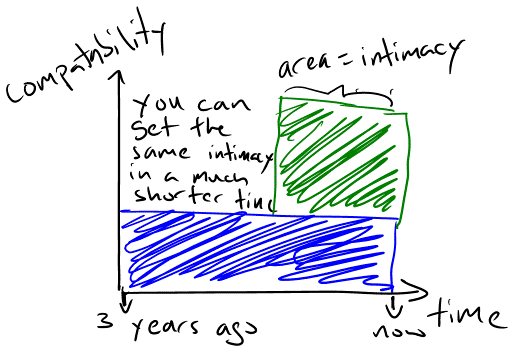Social Interaction and the Internet
 It’s interesting to observe that for all the friends we accumulate over a lifetime, the way we go about getting them is terribly inefficient.
It’s interesting to observe that for all the friends we accumulate over a lifetime, the way we go about getting them is terribly inefficient.
I’m guessing that most people meet friends at events they both attend – at school, it’s a class or a party. At work, it’s, well, they office or the pub.
Consider how improbable it is that two people attending the same event will (1) meet and (2) have enough in common to become friends. Or that two people who could be friends (1) decide to go to the same event, (2) meet, and (3) eventually become friends.
Sure, we filter out some people. For instance, people tend to approach people who ‘look’ like them – wear the same types of clothes and so on. Then, they stay with people who speak like them – slang, jargon, etc. But that in itself is pretty misleading – how many interesting people are you filtering out? I can’t see how wearing different clothes makes you any less worth knowing.
I’m going to guess that it’s pretty unlikely. I’m going to assume that the ‘natural’ way of making friends, dating, and generally finding interesting people is pretty inefficient.
So what does that mean? First of all, that people, by and large, aren’t very picky when it comes to whom they’re friends with. We can guess that when making friends, the degree of ‘compatibility’ (it’s a terrible word, but I don’t have a better one) determines the ‘quality’ of the friendship.
In pure speculation, I’m guessing that if you’re highly compatible with someone, you can establish a high degree of intimacy with someone after just a short time. (That guy sooo understands me, in valley girl-esque speak). I’m further going to guess that you can establish a similar level of intimacy with someone less compatible, but it’s going to take more time – for those who still remember Calculus, it’s a basic integral.
I’ve drawn a small diagram to illustrate the concept. If intimacy is the integral of compatibility between two people and time spent together, then it’s easy to see how you get a similar level of intimacy in a much short time. Of course, it also depends on what ‘type’ of relationship you have – someone you’re dating heavily is much more likely to get their faster than they guy you have a couple beers with after work.

So we can guess that there’s a lot of room to improve how people become friends.
I think that the internet is going to play a pretty big part of that. Currently, there’s no competition. We have the pathetic little dating sites – True, Match.com, Tickle.com, etc. But they’re focused on dating, and their ‘tests’ are quaint but not much more (besides, how many people are honestly going to fill out a few hundred questions just for the sake of meeting a few people?). Social networks are interesting, and enable finding people with similar interests through tag-based interest-fields. Nothing’s going to happen soon.
I’m still keeping an eye on social networks and dating sites to see how fast what’s developing.
 Microsoft released Office 2007 today. I highly recommend it – due to the “Fluent” ribbon-based interface, Office 2007 is excellent. A real pleasure to use.
Microsoft released Office 2007 today. I highly recommend it – due to the “Fluent” ribbon-based interface, Office 2007 is excellent. A real pleasure to use.

